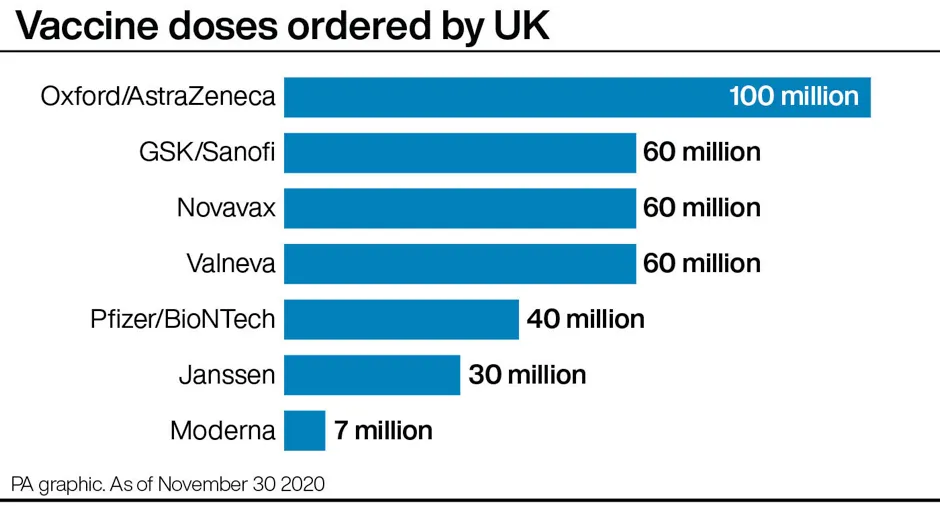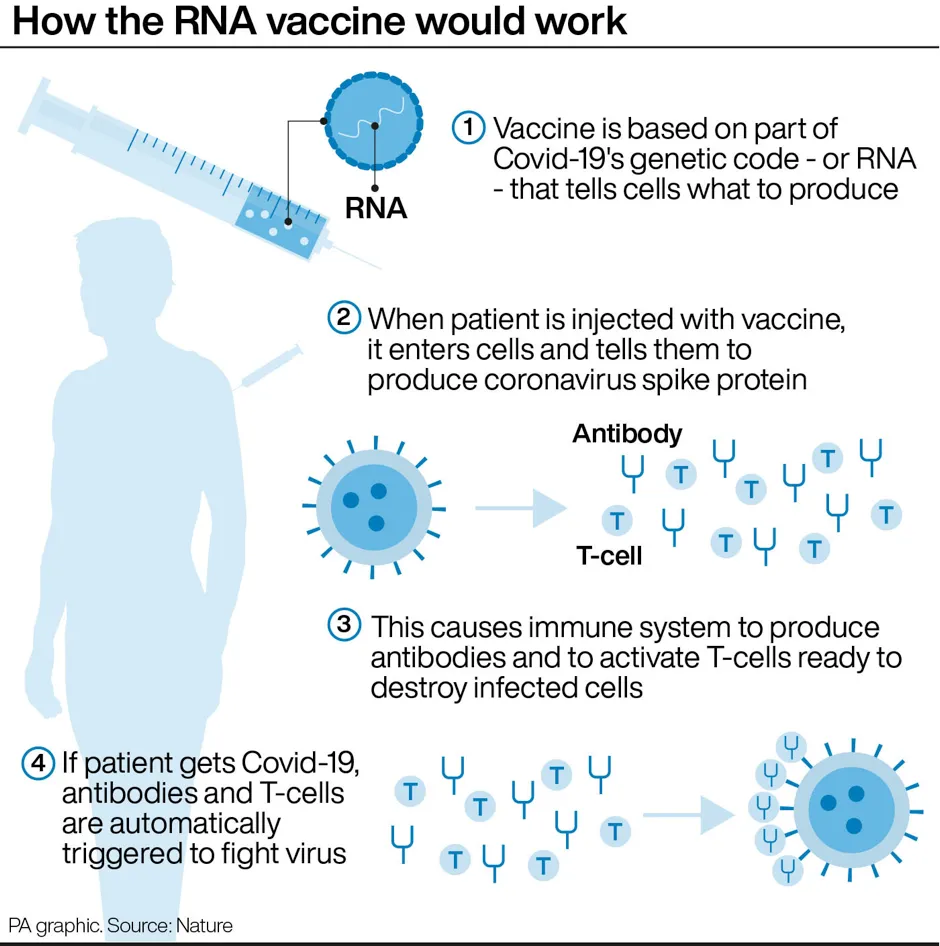The Moderna coronavirus vaccine has been approved for use in the UK.
The jab is the third to be given the green light by the Medicines and Healthcare products Regulatory Agency (MHRA), after the Pfizer vaccine was approved in December 2020 and the Oxford vaccine began its roll-out earlier this year.
But unlike other coronavirus vaccines, the Moderna vaccine will not be available for use straight away, as the first doses are not expected to arrive until the spring
Here’s what we know about the Moderna vaccine.
How was the trial run and what are the results?
Moderna's phase three results suggest vaccine efficacy against the disease was 94.1 per cent, and vaccine efficacy against severe COVID-19 was 100 per cent.
More than 30,000 people in the US took part, from a wide range of age groups and ethnic backgrounds.
Two doses were given 28 days apart so researchers could evaluate safety and any reaction to the vaccine.
The analysis was based on 196 cases of COVID-19 that developed during the course of the trial, of which 185 cases were observed in the placebo group versus 11 cases observed in the active vaccine group.
Moderna also released data relating to severe cases of COVID-19. There were 30 people who had a severe case, and all 30 occurred in the placebo group. There were no severe cases in the group which had received the vaccine, known currently as mRNA-1273.
The US firm said its trial results indicate the jab is generally well-tolerated with no serious safety concerns. While the vaccine's efficacy may drop over time, scientists have said it should protect against around 9 in 10 cases of COVID-19.

When will people in the UK get the vaccine?
The UK Government had originally signed a deal for seven million doses of the Moderna vaccine for the UK, but has since agreed to purchase an additional 10 million doses.
As agreed when the UK originally pre-ordered the vaccine, supplies will begin to be delivered to the UK from spring once Moderna expands its production capability.
How does the Moderna coronavirus vaccine work?
The Moderna vaccine works in a very similar way to the jab from Pfizer/BioNTech.
Coronavirus is studded with 'spike proteins' that it uses to enter human cells. COVID-19 vaccines target this spike protein.
Conventional vaccines are produced using weakened forms of the virus, but mRNAs use only the virus’s genetic code. The Moderna and the Pfizer vaccine both use synthetic messenger RNA (mRNA), a genetic material that contains information about the spike protein.
An mRNA vaccine is injected into the body, where it enters cells and tells them to create antigens. These antigens are recognised by the immune system and prepare it to fight coronavirus.

No actual virus is needed to create an mRNA vaccine. This means the rate at which the vaccine can be produced is accelerated.
Can this vaccine help the elderly?
There have been concerns that a COVID-19 vaccine will not work as well on elderly people, much like the annual flu jab.
But data from Moderna suggests the jab is highly effective in preventing people getting ill and works across all age groups, including the elderly.
The Pfizer and AstraZeneca jabs have also been shown to work effectively in the elderly.
Is the Moderna vaccine safe?
Moderna said the vaccine was generally well tolerated, with no serious safety concerns identified to date.
Severe events after the first dose included injection-site pain, and after the second dose included fatigue, myalgia (muscle pain), arthralgia (joint pain), headache, other pain and redness at the injection site.
But these were generally short-lived.
Is the Moderna vaccine better than those from Pfizer/BioNTech or Oxford and AstraZeneca?
The UK is already rolling out the vaccines developed by Pfizer/BioNTech, and the University of Oxford with AstraZeneca.
Data published in The Lancet medical journal in early December showed the Oxford vaccine was 62 per cent effective in preventing COVID-19 among a group of 4,440 people given two standard doses of the vaccine, when compared with 4,455 people given a placebo drug.
Of 1,367 people given a half first dose of the vaccine followed by a full second dose, there was 90 per cent protection against COVID-19 when compared with a control group of 1,374 people.
Data from Pfizer and BioNTech indicates the vaccine is 95 per cent effective.
In December, this jab was granted approval for use in the EU.
Plus, Moderna’s vaccine does not require the same ultracold storage as Pfizer’s and can remain stable at normal fridge temperature for 30 days.
However, it is difficult to say whether one option is better than the other, as each trial has had different protocols and they cannot be directly compared.
- Read more answers to questions about the coronavirus vaccine: is it safe?
